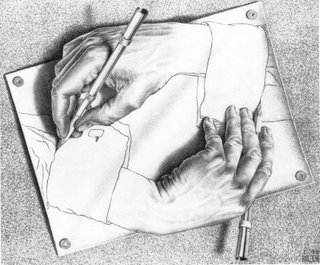On the democracy of nowhere
When Thomas More imagined an idealized place, he called it Utopia; that is, no-place. Following the lead of one John Milbank, I am going to state baldly that the internet is precisely the utopia of the modern world. In a sense, it is idealized community. But one must never forget that it is not a place, but a non-place.
So what?, you may wonder. Just this: inhabiting a place involves being confronted with an other, a stranger/neighbor who can surprise as well as harm. Space is the possibility of being near, and with time, the possibility of true friendship. I agree with Aristotle that friendship implies a wish to live together, to share a common life, and it is only within friendship that one can cultivate and practice the fullness of human virtue.
Because the internet is no-place, people can always turn their backs on those physically proximate to face those virtually present. At its best, this can be a convenient suture for friendships that otherwise might be lost by distance. However, all too often, I can avoid loving my neighbors by escaping into an electronic world of my own creation. And, because I have created it, it is not truly an other. Instead, my online persona becomes the commodification of my identity, the packaging and advertising of my own experience for entertainment and consumption.
Under such conditions, the web's illusory democracy of ideas meets its dialectical negation: the tyranny of the yuppy. If abstract (i.e., not concrete and not placed) community allows the democratic reign of ideas and opinions without the baggage of social status and cultural prejudices, this same realm produces the ultimate marketized individual. In the security of his/her domain name, he/she can dictate the terms of virtual life to almost infinite detail. Appearance literally is everything here, and choice is the only way to exist in this reality. Incoming communication can easily be moderated and ignored. And, if he/she advertises well, he/she may earn an income from this online personality.
Thus, if one's virtual life eclipses one's interactions with real neighbors, the otherwise democratic utopia of the internet may cause a person to maintain a tyrannical hold on their individuality, lacking the habits of patience and hospitality, an openness toward what is unexpected and even undesired, that are necessary for true human community. Even liberal virtues like tolerance and respect for privacy are not necessary for the electronic individual.
The great cause for hope and perseverance is that the above scenario is posited upon a hypothetical. Such tyranny is not a necessary by-product of e-life. For this reason, I am not guilty of hypocrisy by posting this essay on my own weblog. Nonetheless, I post cautiously because I may be susceptible to my own critique and become the one I despise.

